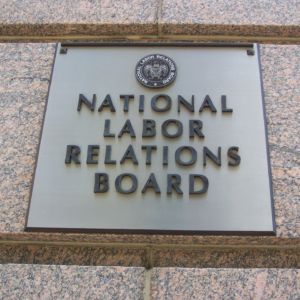The federal agency tasked with resolving labor dispute cases is facing questions about double standards double after a decision Monday to restore a controversial Obama-era rule. The National Labor Relations Board (NLRB) decided to update what is known as the joint-employer standard back in 2015. The decision faced a fierce debate which eventually led to a new board upending the decision last year. But that board soon after restored the contested decision over a possible conflict of interest.
The NLRB Inspector General recommended the board vacate its decision from last year and restore the updated joint-employer standard. The National Right to Work Foundation (NRTW) believes there might be a double standard given previous cases – resulting in the group filing a Freedom of Information Act (FOIA) request.
“The NLRB’s Inspector General appears to be setting a troubling double standard regarding recusals, especially considering the same office looked the other way when former Service Employees International Union lawyer and Obama appointee Craig Becker refused to recuse himself from cases involving the SEIU and its affiliates,” NRTW President Mark Mix said in a statement.
The FOIA request is intended to uncover information regarding possible efforts to prevent a full five-member board from thoroughly reviewing the updated standard. It requests information regarding how the board and Inspector General determine whether there should be a recusal, and how that applied to the recent joint-employer ruling.
In addition, the NRTW is seeking information, documents, and communications regarding any other recusal determinations since January 1, 2009. The request also asks for related communications from board members, staff, lawmakers, the press, and union officials.
“The public deserves to know the truth surrounding this double standard, especially given that it advances the concerted effort by Big Labor and its allies to block a full NLRB from reviewing controversial Obama-era rulings that limit the rights of workers who don’t want to associate with a labor union,” Mix said.
The joint-employer standard determines whether an employer is legally responsible for the employees of a company it contracts with. The updated standard made it easier for companies to be declared a joint-employer. The business community and other critics argued it was overly vague and put employers at unnecessary legal risk.
Employers take on many legal burdens and potential costs when they become joint-employers. The standard was previously determined based on whether a company had direct control over the employment policies of another business–like wages, the hiring process, or scheduling. The updated standard is instead based on indirect control.
Former President Barack Obama was in office when the board implemented the updated standard. The NLRB set the precedent for the update when it ruled on a case involving Browning-Ferris Industries. Since President Donald Trump entered office, a new board has worked to restore the old standard.
The new NLRB overruled the contested decision last year when ruling in a case involving Hy-Brand Industrial Contractors. The NLRB Inspector General soon after issued its report which found a possible conflict of interest involving board member William Emanuel. The board then decided to vacate that decision Feb. 26.
The report argued that Emanuel should have recused himself from the decision last year because he has a conflict of interest. His former law firm represented one of the companies involved the 2015 case that set the precedent for the updated joint-employer standard.
Those in support of the updated standard have argued that it was a needed change that prevented employers from sidestepping their responsibilities. They believed large companies were using the contracting relationship to separate themselves from workers who should be considered their employees. It also opened the door for unions to potentially organize multiple workplaces at once by having the employees under the same employer.
The business community and its supporters have fought back against the updated standard since the beginning. The Coalition to Save Local Businesses was formed by business groups who argued the update could jeopardize the many businesses that contract together.
The International Franchise Association and other coalition members have spoken with lawmakers, launched media campaigns, testified during hearings, supported lawsuits, and backed opposition efforts. They have also expressed support for a bill meant to codify the previous standard.
The NLRB Inspector General didn’t return a request for comment when asked by InsideSources. The NLRB declined to comment.

